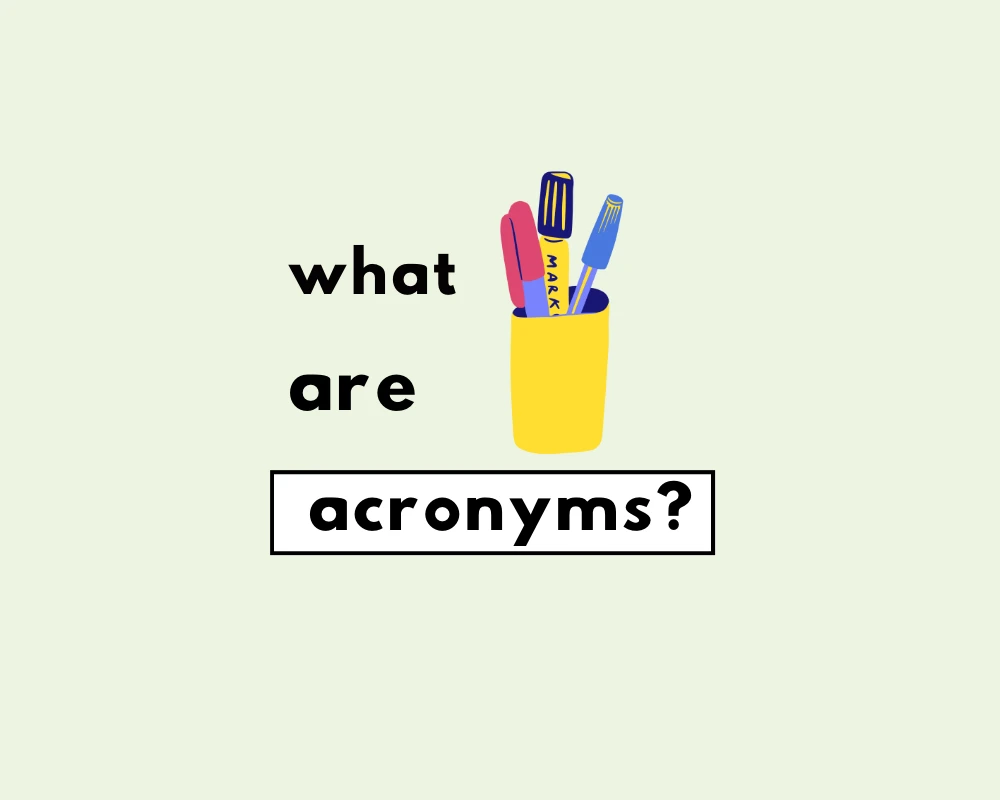Contents
ToggleWhat are acronyms in grammar?
The English language has a true appreciation for its abbreviations. Acronyms, pronounced like akro–nim, are a type of abbreviation where each words in a series or phrase forms a new word (more specifically called an acronym).
Types of abbreviations
Abbreviations refer to any word or series of words that have been shortened from its original form. There are four main types of abbreviations commonly used in English:
1. Acronym,
2. Initialism;
3. Shortening/truncation,
4. and Contractions.
NASA (National Aeronautics and Space Administration), FOMO (Fear Of Missing Out); YOLO (You Only Live Once), and SCUBA (Self-Contained Underwater Breathing Apparatus) are each examples of acronyms. Note that an acronym shares the same meaning as the phrase/term it represents—the difference is in how it’s pronounced, and that it offers a more convenient way to refer to the exact same thing. Let’s take a gander at how acronyms differ from the other types of abbreviations, in the following sections.
Acronym vs. initialism
Compare the following:
Initialism: FBI (Federal Bureau of Investigation), FYI (for your information), LOL (laugh out loud, sometimes pronounced like lewl); BTW (by the way), BRB (be right back); ASAP (As Soon As Possible).
Acronym: NASA, SCUBA, YOLO.
In English, initialisms are a type of abbreviation where each initial letter that makes up the phrase are spoken aloud individually, such as FBI or ASAP. By contrast, acronyms like NASA and LASER (Light Amplification by Stimulated Emission of Radiation) form new pronunciations altogether from the individual letters.
Acronym vs. shortenings (or truncations)
Compare the following:
Shortening/truncation: Cont. (continued), Prof. (professor), Mr. (Pronounced mister), Dr. (doctor); and Mrs./Ms. (Mrs. is pronounced miss–us, where Ms. is spoken like miss.)
Acronym: NATO (North Atlantic Treaty Organization), FOMO, SCUBA.
Initialism: FBI, BTW, ASAP.
With words that are shortened or truncated, as is the case with Dr., Prof., Mr., and other occupational honorific’s, the abbreviated version sounds the same as its original form, and the abbreviation itself is a trimmed version of the original form. Most often we use a period after to indicate its shortened/truncated form. This also notably differs from acronyms and initialisms because shortened abbreviations oftentimes do not represent a series of words in a term, but rather a single word chopped down (in most cases).
The other class of abbreviation are contractions: doesn’t, isn’t, aren’t, and so on. Contractions typically formed by merging words through an apostrophe, and removing part of the word itself. Contractions are used all the time in conversation and writing; though when it comes to formal/academic writing, it’s best to avoid the contracted form of words.
List of commonly used acronyms in English
AIDS: acquired immunodeficiency syndrome
Amphetamine: alpha-methyl-phenethylamine
AWOL: Absent WithOut Leave
FUBAR: F***ed Up Beyond Recognition
BOGO: buy one, get one (free)
SCUBA: self-contained underwater breathing apparatus
PIN: personal identification number
CAPTCHA: Completely Automated Public Turing test to tell Computers and Humans Apart
POTUS: President Of The United States
FLOTUS: First Lady Of The United States
SCOTUS: Supreme Court of the United States
SWAT: Special Weapons and Tactics
IMAX: Image Maximum
BAE: Before Anyone Else
MoMA: Museum of Modern Art
GIF: Graphics Interchange Format
Navy SEALS: Navy Sea Air Land forces
OSHA: Occupational Safety and Health Administration
WHO (used as an initialism or acronym): World Health Organization
NAFTA: North American Free Trade Agreement
UNICEF: United Nations Children’s Fund
Initialisms
DOA: Dead Upon Arrival
DOB: Date Of Birth
CDC: Centre for Disease Control
ADHD: Attention Deficit Hyperactivity Disorder
ADD: Attention Deficit Disorder
IQ: Intelligence Quotient
MD: Doctor of Medicine
SUV: Sport Utility Vehicle
PS: Post Script (from Latin, postscriptum)
DND: Do Not Disturb
CST: Central Standard Time
PST: Pacific Standard Time
MST: Mountain Standard Time
AM: Ante Meridiem
PM: Post Meridiem
TBD: To Be Determined
TBA: To Be Announced
FYI: For Your Information
MBA: Master of Business Administration
HR: Human Resources
ETA: Estimated Time of Arrival
BTW: By The Way
BRB: Be Right Back
LOL: Laugh Out Loud
EOD: End Of Day
EOW: End of Week
Catch up on Gflex articles!
- What are Common Nouns vs Proper Nouns?
- What are Collective Nouns? (Collective Nouns vs Mass Nouns)
- Plural Only Nouns (Explanation & Examples)
- Abstract Nouns vs Concrete Nouns Explained
- What are Possessive Nouns? (Formation of Possessive Nouns)
Sources
1. “Types of abbreviations”, https://www.crownacademyenglish.com/types-english-abbreviations accessed on January 19, 2023.
2. “What is an Acronym?” https://www.grammarly.com/blog/acronym/, accessed on January 19, 2023.
2. “List of Commonly Used Abbreviations” https://abbreviations.yourdictionary.com/articles/list-of-commonly-used-abbreviations.html, accessed on January 19, 2023.










